Shelf Life: Sweetness & Lightning
- Oct 1, 2019
- 15 min read
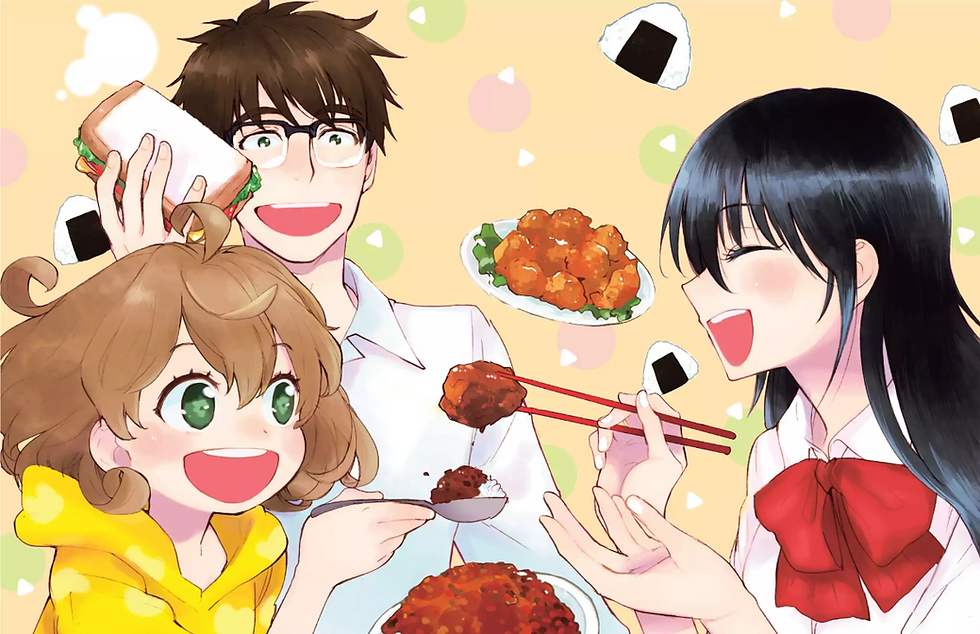
Those of you who have followed my anime reviews for a while now probably know this already but some of my favorite works are those that feature a concept I and others refer to as "The Power of Children." For those unfamiliar with the concept or my particular fascination with it, "Power of Children" stories are those that focus on the influence children have on lives of those around them. Without necessarily being the perspective character of their stories, the children in these stories often serve as catalysts for great personal change due to either their infectious energy or because they lack all the prejudices and misconceptions the previous generation grew up with. For example, in Mitsuboshi Colors, we see this concept play out as its three child characters engage with the residents of their local town and drag them into their games and misadventures, quietly and unintentionally making it clear that their town is an ideal place for kids to grow up. In Yotsuba?!, the titular main character regularly confounds her elders and forces them to question various social norms as she, being the child she is, encounters and questions them as someone who hasn't yet learned the lessons most adults consider to be plain common sense. Barakaman, then, takes both of those uses of the "Power of Children" theme and melds them into a dramatic story of an young man whose passion for calligraphy is reignited as a local brat almost literally drags him out of his own head and forces him to recognize the struggles of those around him and, with that new information, reevaluate his own life. In time, I'd really like to reengage with all of these works and see where their stories went. Today, though, I thought I'd christen my new review segment for manga and light novels with a manga I'm inclined to consider my favorite "Power of Children" story yet--Sweetness & Lightning or Amaama to Inazuma.

That's right. I like this series more than Yotsuba?!. Fight me.
Now, in the interest of full disclosure, I'll admit that I have two primary reasons for loving this series as much as I do. The first and easiest to explain is that I've already watched and reviewed the anime adaptation of the manga and loved it to pieces. If you want to check out that review, one that is colored only by my impressions of the show itself, check out the link in the Related Posts tab at the bottom of this page. Having loved the show to the point that I wanted more, though, I took it upon myself to read the manga in its entirety and patiently waited for each new volume until its conclusion. This is, of course, what inspired me to make this segment at all; so, it only makes sense that it's the first manga I'll feature here. My second reason for loving this series, though, is a bit more complicated and will require some explanation. To put it as simply as I can, I believe that this series is the exemplar of the Power of Children genre. It is a Master of all Trades when it comes to presenting and expressing the ideas and themes I've seen in every other PoC story. Where most titles only focus on one or two ways children influence the world around them, this one manages to feature and excel at every one of those methods and still ends up being a coherent and meaningful story. This range and quality of PoC storytelling are, of course, due in large part to the variety of characters the manga can focus on at any given time. Each of the series' characters, main or otherwise, brings a distinct brand of personality, humor, drama, and underlying trauma that allows the series to engage with a wider range of human experiences. While that breadth of experience doesn't necessarily mean that the series is for everyone, it does make it a lot easier for me to recommend it to anyone with a passing interest in PoC stories or heartwarming family narratives.
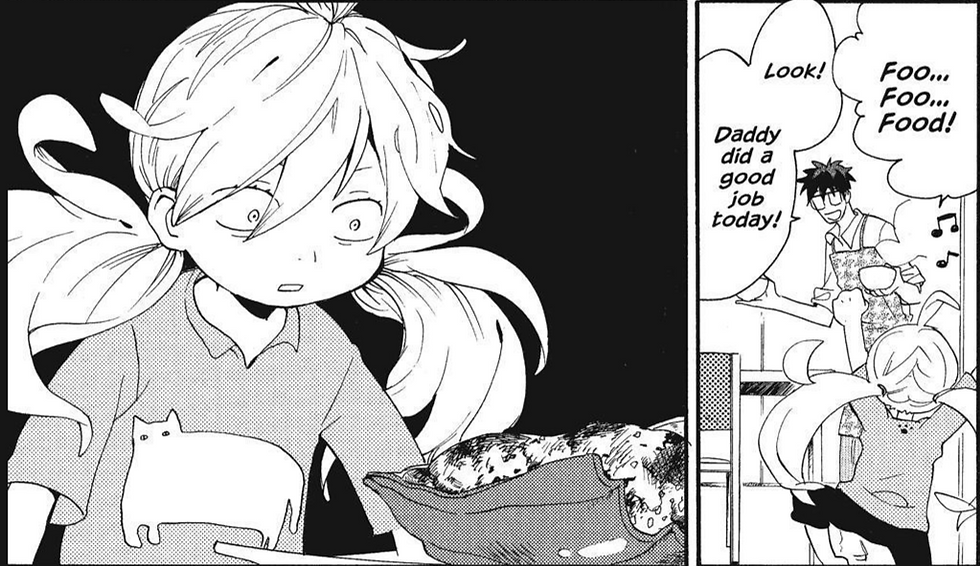
For anyone else, though, I can recommend the series just for Tsumugi's priceless expressions.
In other words, Sweetness & Lightning has the ability to appeal to more people because it features a variety of characters that each speak to different experiences, ideals, and preferences. For example, like Yotsuba?!, this series has some cross-generational appeal because each of it's primary characters represent different stages of life. Inazuma Tsumugi, the main little girl of the series, speaks strongly for the young and inexperienced. Though she's not as self-centered as most kids her age, for reasons that become clear early on, she is still very much a child. Like most children, she has a flighty and mercurial personality that can be fascinated by something one minute and then be bored of it the next. As she steadily grows older throughout the mange, though, we see her pick up habits from the people around her and apply some of the harsh lessons she's learned along the way. This juvenile attitude and ability to grow and learn make Tsumugi a fantastic role model that other kids while still being a child character in her own right. One of the best examples of this comes from a segment from the anime that I've seen people share repeatedly simply because of how adorably childish it is. In this segment, Tsumugi sets off on a journey to get some food for her dad who is bedridden with a cold. Along the way, she occasionally gets lost in her own imagination and eventually starts to freak out as she remembers that she's not allowed to go out on her own and starts to understand why. Though everything still turns out well in the end, this segment perfectly encapsulates how childish, reckless, headstrong, and considerate this four-year-old is. Yet, while she still gets scolded for her recklessness, the show and manga manage to offer kids a lesson on how important it is to not run off alone without diminishing Tsumugi's praise-worthy courage. For parents and caregivers, though, this segment serves as an unsettling reminder of what could happen if you leave your child unattended.
For anyone who hasn't seen it before, this clip is an absolute treasure.
Throughout the entirety of this manga, a lot of effort is put into making sure each character's perception is taken into account. It is that dedication to varied perspectives, then, that allows the show's drama and overarching focus on watching a family heal to work. Fluffy and wholesome as this show is a lot of the time, the actual core of this story takes a lot of its cues from other PoC works like Barakaman and Pocco's Udon World that feature some amount of anxiety and drama to bubbling beneath the surface. In Sweetness & Lightning's case, that underlying drama is born from us meeting the Inazuma family during the darkest moment of their lives thus far--following the death of Tsumugi's mother or Kouhei's wife, depending on whose perspective you honed in on at the start. More specifically, we meet them six months after the fact, at a point when the initial grieving stage has passed but the reality of their new situation has only just starting to sink in. Because of this start point, we are introduced to the cast just as they've gotten comfortable with their new "normal" routine. We see Tsumugi being the happy, noisy, TV-obsessed child she's supposed to be and Kouhei struggling but generally doing an alright job of juggling his job as a teacher and his role as a father. From both their perspectives, everything looks fine at a glance apart from some fairly obvious and understandable strain on their father-daughter relationship. Tsumugi, for her part, has moments where she lingers on some thoughts or reacts to things in such a way that it feels like she's still a little disconnected from reality. As for Kouhei, it is clear from the start that he is tired and generally unsure of how he's supposed to raise Tsumugi on his own but is still trying his best anyway. These are, again, perfectly understandable struggles and inconsistencies given their situation. After watching their little routine go on for a couple of days, though, it steadily becomes clear that something isn't right. First and foremost, we start to see the shortcuts Kouhei is taking to save time and energy, noted most prominently in the habit of him only giving Tsumugi pre-made meals that she never finishes. Secondly, through Kouhei's regular use of a sitter and late nights at work, we start to see that Tsumugi and Kouhei aren't as present in each other's lives as they should be. Then, all at once, their happy family facade shatters in a single moment that is just as powerful in the manga as it is in the anime.
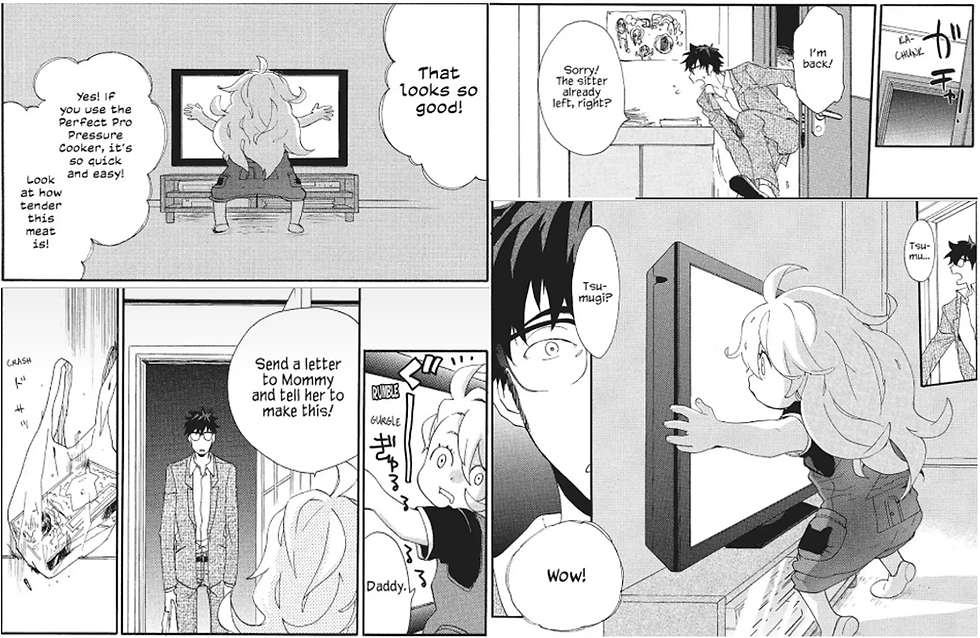
It's at this specific moment that you realize what kind of story this is going to be.
Once that veil of happiness is lifted, it becomes clear that the story of Sweetness & Lightning is going to be a bit of a gut-puncher for its older audience. In the span of the three pages that make up this scene, you instantly understand just how bad things are for Kouhei and Tsumugi. We learn, first and foremost, that his lethargy goes beyond simple exhaustion and is more likely a symptom of severe depression. Similarly, we learn that part of the reason why Tsumugi is so bright and cheery is because she still doesn't understand what happened to her mom. This would normally come as no surprise since most children don't understand what death is until they've encountered it but that specific reaction makes it obvious that Kouhei hasn't talked to her about it. Yet, just as the reality of their situation is made clear as day, Sweetness & Lightning instantly takes these two deeply troubled characters and sets them on their road to healing, introducing us to the story's main gimmick in the process.
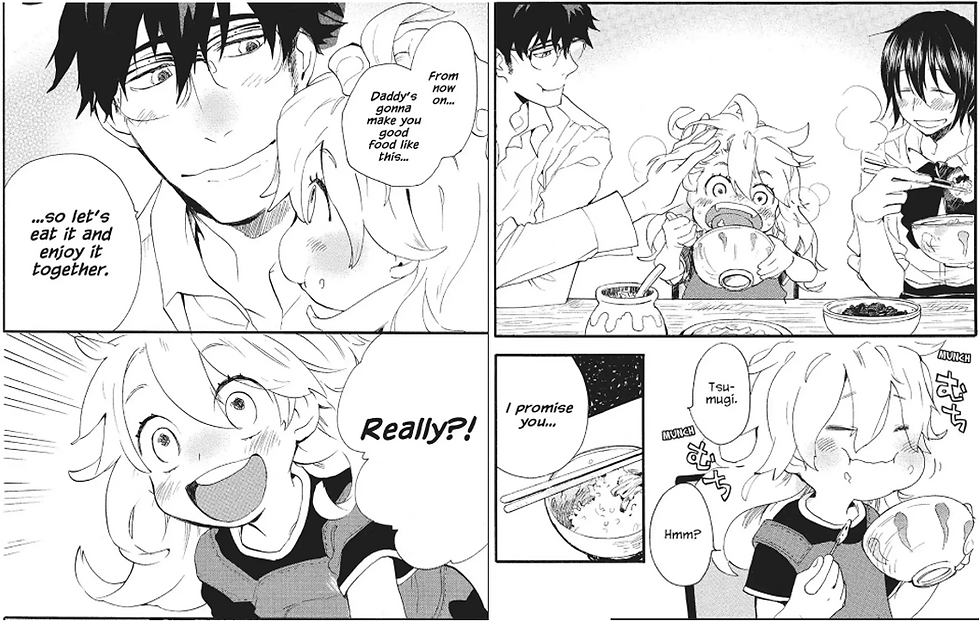
Nothing heals the soul like a good, home-cooked meal.
Honing in on the fact that Kouhei's ineptitude as a single father has left Tsumugi wanting for healthy, nutritious meals, the series turns his pledge to learn how to cook real meals for his daughter into an avenue for them to simultaneously address and solve the near-infinite number of issues bound to crop up as they reconnect with each other. Much like cooking itself, though, Sweetness & Lightning makes it abundantly clear that Kouhei and Tsumugi's emotional recovery is going to be a long and arduous process. In each chapter, little problems pop up here and there, like Tsumugi's adventure, that might not have the same impact as that initial bombshell but are still essential moments in these characters' lives. Especially since Tsumugi is a preschooler at the start of the series, several chapters are dedicated wholly to Tsumugi struggling to express herself or learning lessons typical of most children--ranging anywhere from learning how to share to teaching her classmates that boys and girls can play together. Meanwhile, as Tsumugi is growing up and learning how the world works and who she wants to be, Kouhei spends his time learning how to better manage his family and work life. More specifically, he spends a lot of time playing catch-up to the other families he interacts with through Tsumugi's preschool and trying to recall all the responsibilities his wife took care of originally and have been neglected since her passing. The first among these, obviously, was her skill at cooking and managing the house but that's far from everything. As a single father now, he's also forced to learn how to guide and support his daughter's growth, as opposed to just caring for her. What that means in reality, though, is that Tsumugi's growing up is going to be just as much a learning curve for him as it is for her since he's clueless about how girls develop. Despite how heavy or awkward things get between them, though, the series always finds a way to bring everything around to a happier, more hopeful tone that reinforces the all-too-necessary belief that they're going to be just fine when all is said and done.
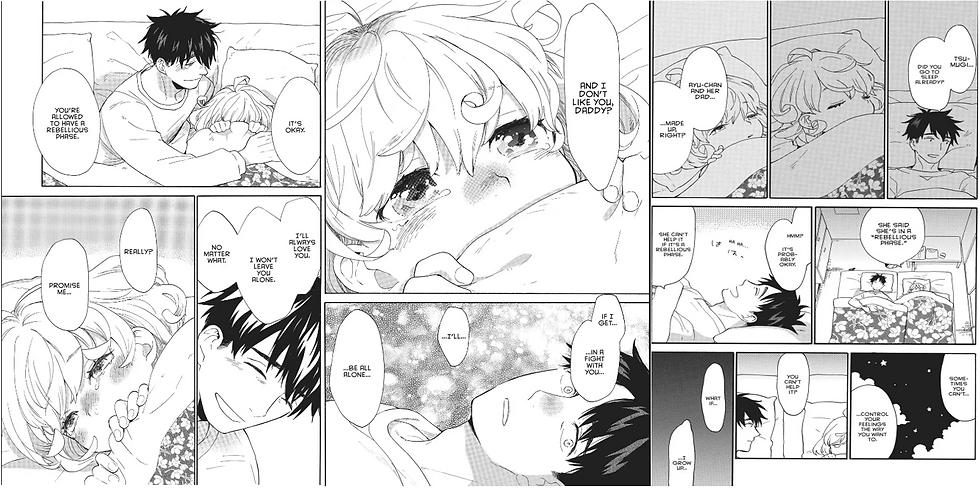
Sorry, did I imply that later segments never hit as hard as the first chapter's revelation? Yeah, uh...that's 1000% not the case at all.
To be clear, though, this story doesn't begin and end with just these two. As I said already, a large part of Kouhei's perspective is dedicated to him learning to better manage his time. This includes both his time being Tsumugi's father and his skills at being an all-around good teacher. Because of this and her being introduced to the story as Kouhei's mentor and fellow student in the art of cooking, we also spend a lot of time with one of his high school students, Iida Kotori. Like Tsumugi and Kouhei, Kotori brings a lot to this series that expands on what this story can and does address. Though her problems and family dynamic are very different from the Inazuma family's struggles, she serves as a launch point for both their growth as a family and for the eventual discussions on what problems can crop up in a family where the parents are divorced. More directly, though, Kotori exists as a middle-point between Kouhei and Tsumugi's perspectives. As a teenager, she's considerably more experienced and mature than Tsumugi but still has a long way to go in life. Like Tsumugi, she's still unsure about who she wants to be and what she wants to do when she gets older but she is at least old enough to consider her possibilities seriously. In other words, both her specific problems and where she is in life make her an ideal foil for the Inazumas and the problems they're just starting to work through. Ideal as she is for that role, though, I can't stress enough that she doesn't exist solely to expand Kouhei's story. Rather, once the series hits its stride and has given Kotori enough time to let Kotori's awkward but thoughtful personality take center stage, several chapters are dedicated to letting her sort out her family problems, work through her insecurities, and just kinda figuring out what she wants out of life.

Unfortunately, my only real nitpick with the story is that one of the things Kotori wants in life is
her teacher's affection--an aspect of her character the anime glossed over entirely.
Were I to sum things up neatly, one of the largest factors that won me over to this series as a whole was that it knows how to work with its characters. Kouhei, Tsumugi, Kotori, and all the other members of the larger cast are each given unique and believable personalities that define who they just as much as it hinders them once their personal stories start to gain traction. In this way, they all end up becoming complex and conflicted people who struggle with incredibly mundane issues the same way most people do. Kouhei, for all his social ineptitude and self-sufficient pride, spends a lot of time making up for mistakes born solely from him not talking things out or knowing how to engage with his more sociable daughter. Kotori, for all her insecurities and selflessness, ends up causing problems and misunderstandings simply because she doesn't know how to read when she needs to let people sort out their own problems. While I'm on the topic, though, it should also be noted that even Kotori's crush on Kouhei is handled with a lot of thought and caution on both sides--once her feelings are made obvious to him, of course--making that specific aspect of their relationship far more tolerable than most student-teacher crushes I've seen. Now, as for Tsumugi, the way the series manages to address her characterization is honestly a stroke of genius on the author's part and one of the main reasons this series stands as king of the PoC genre. Willful and childish as Tsumugi is, the series manages to portray her in such a way that it capitalizes on both her being a child and the tragedy of losing her mother at a young age. Namely, Tsumugi acts very much like a child her age would while also have a side to her that reflects the things she's gone through. Like any child, she naturally has a mercurial personality that can be happy and bubbly one moment and inexplicably dour the next. She is presented as being a character who always wears her heart on her sleeve, most of her emotions and actions are intrinsically tied to whatever she's thinking or feelings in that moment. The one key developmental difference between her and her peers, though, comes from her premature realization that the people around her are vulnerable. Namely, through her mother's death and her father's quiet but obvious emotional breakdown, she sees that he is just as as confused and vulnerable as her. So, channeling the kind of self-centered and self-serving empathy kids are known for, Tsumugi is regularly seen trying to make her dad's life easier. Whether she does so consciously or not, it is made cleat that she worries that he might disappear too if someone doesn't take care of him. Of course, now that her mom is gone and she is only person he has left, that someone has to be her. As Tsumugi grows older and more experienced, though, that premature awareness grows along with her. As she steadily develops, both physically and emotionally, she grows into someone capable of recognizing other people's pain and addressing within the context of the pain she's felt and, for the most part, overcome.
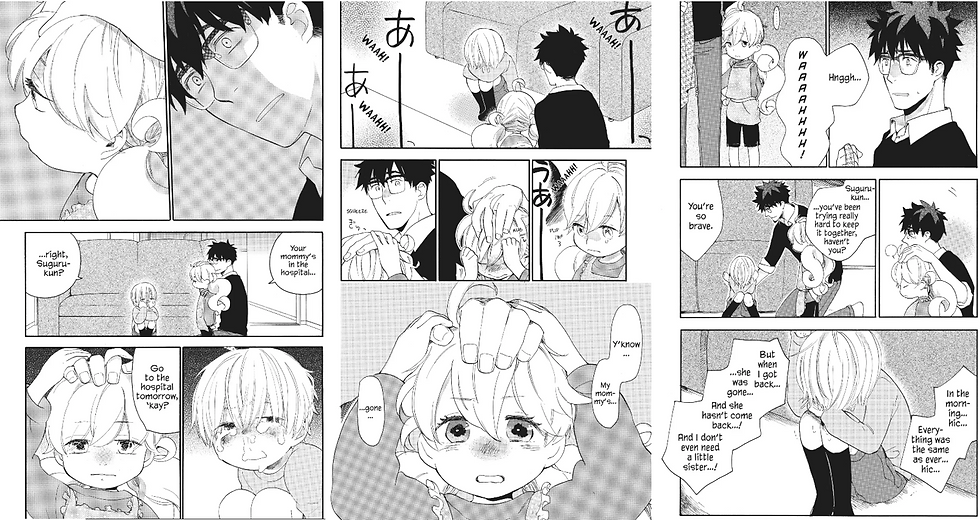
Tsumugi is, hands down, the best-written child character I've ever seen.
No matter how thoughtful and worldly she might be, though, the series also makes it clear that Tsumugi is still the child she's supposed to be. Her experiences and premature awareness of other people's thoughts and feelings might make her more inclined to help someone in need than other kids her age but that doesn't make her any more capable of handling or understanding her own emotions. Like most kids, Tsumugi is still selfish and self-centered to a fault. When things don't go her way or she finds herself incapable of voicing the feelings and anxiety she's dealing with, she lashes out just like any other kid would. In fact, a lot of the fights Tsumugi gets into with her dad and friends are the result of her not knowing what she wants to say or do. That confusion, then, only frustrates her further until she inevitably starts to throw a tantrum or shuts down until someone else can rationalize what she's going through. That helplessness, appropriate as it is for a kid her age, is especially problematic for Tsumugi though when you understand that she's operating on the idea that she needs to be strong enough to support both herself and her father. One of the most solid examples of where that self-awareness and helplessness do her more harm than good comes when she and her dad rescue a lost cat and take it in. Like most kids would, she grows attached to the cat and wants to keep it even though she knows it belongs to someone else. When the time comes for her to give the cat back, though, Tsumugi simply shuts down and stubbornly refuses to let this other little girl take it away, even though she's in tears. Taken at face value, this is just a very childish thing to do and Tsumugi knows very well that she's in the wrong. Tt's also understandable why she would react so strongly though. Despite only knowing the cat for a little while, Tsumugi instantly falls in love with it and is afraid she'll lose it. Yet, when the cat's owner finally comes to take it back, that fear multiplies under the realization that she's powerless to stop something she loves from being taken from her. So, putting up what little resistance she can, she blocks the little girl from reuniting with her cat and refuses to budge until she's made to understand that she's causing this girls just as much pain as she feels in that moment--making her no better than the villains in her cartoons.

On a lighter note, it should be said that this kid is an absolute riot when she's in the middle of an irrational tantrum.
To summarize all this as plainly as I can, all the lessons this story has to offer and the complexity of it's cast are what make Sweetness & Lightning an absolute masterpiece in my mind. The fact that it's a PoC story is just icing on the cake but that's ultimately what it'll always be for me at the end of the day--a Power of Children story that manages to adopt and excel at using every PoC story hook I've seen to date. Like Yotsuba?!, this series hooks you by offering a variety of different characters and perspectives that open it up to a cross-generational audience. Also like Yotsuba, Tsumugi's childish naivete serves as a great springboard for important lessons and discussions for kids while any adults, meanwhile, learn from the teenagers and parents. Like Mitsuboshi Colors, large swaths of this story are focused on Tsumugi's childish antics and how her personality comes to influence those around her. Then, once the level of personal drama found in Bakramon is added to the mix, it makes perfect sense why Tsumugi is as influential as she is. Confused and helpless as she might be to her own emotions, Tsumugi's willful personality and awareness of other people's struggles give her the unique ability to move and influence her friends and family. More specifically, her blend of helplessness and willfulness move those around her to act, forcing them to look outside themselves and reevaluate for Tsumugi's sake. That power only grows, though, once she gets the ball rolling and sets off a chain reaction that draws dozens of other characters into her story, priming them to influence others the same way she influenced them. What impresses me most of all is that this series managed to remain focused on Tsumugi and the good she brought about. Namely, toward the series' end, we're given a crystal clear image of just how much good Tsumugi did throughout the series when we see just how much everyone's struggles and the lessons they learned together influenced the woman she eventually becomes.
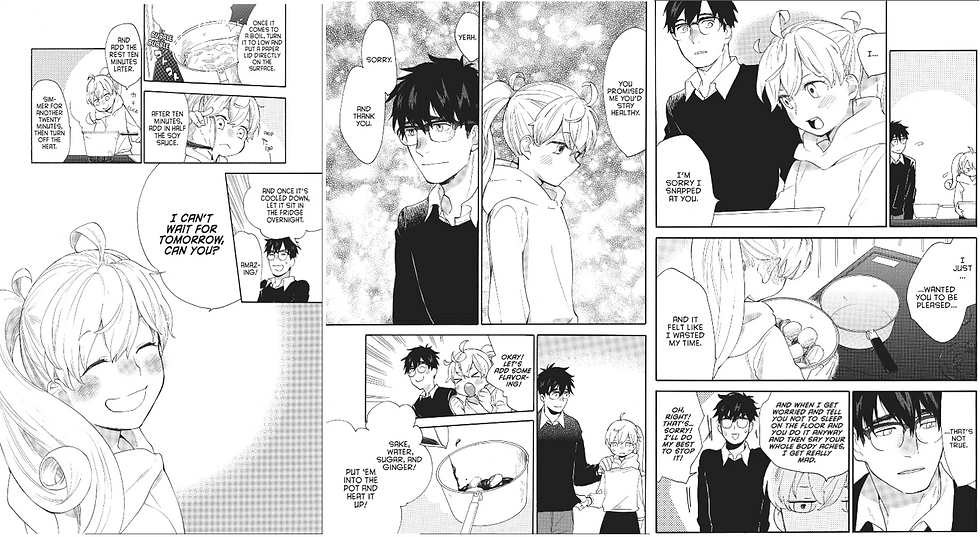
Call me a sucker for some solid payoff but the final volume's dedication to showing just how much her youth influenced her adult life--awkward as it was to read--made the whole journey that much more worthwhile. I already loved this series to pieces but that last little bit of character development is what made this story really special for me. So, whether you get invested in the characters of this story or end up only caring about all the recipes it has to offer, it's my sincere hope that you give this manga a read. That might not be my conclusion for every entry into this new review segment but I think it's a good way to start things off.


Comments